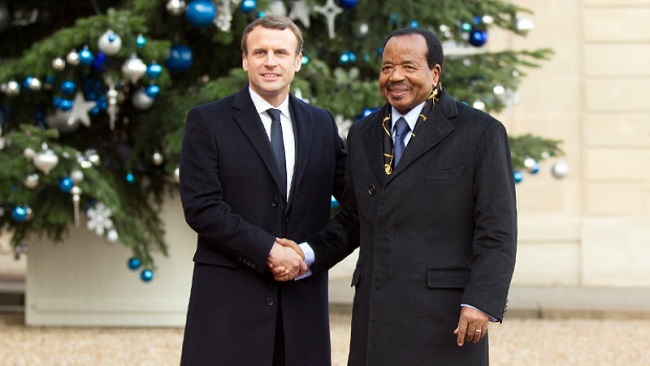Southern Cameroons Crisis: After a week of tensions, Macron defuses the situation with Biya
Macron and Biya put aside their differences to talk about resolving violence in Cameroon.
The presidents of France and Cameroon “agreed on the need for an impartial inquiry” into the violence perpetrated in Cameroon’s Northwest Province during a phone conversation between the two heads of state on Sunday, 1 March.
Emmanuel Macron’s controversial remarks that set off a firestorm on 22 February when he promised to exert “maximum pressure” on Paul Biya to bring “Cameroon’s intolerable violence” to an end are but a distant memory. The French authorities are now evidently looking to calm the diplomatic spat.
The terse communiqué released by the French president’s press office expresses France’s evident resolve to de-escalate tensions between Yaoundé and Paris after they had mounted in the week leading up to 1 March.
Accordingly, during the phone call, Biya and Macron “agreed on the need for an impartial inquiry in response to the violence perpetrated against civilians in Ngarbuh village in the Northwest Province.”
Hardly a concession for Yaoundé given that it recently ordered the opening of an inquiry.
Significant support
The very same communiqué also indicates that “both presidents agreed to keep in touch to follow up on the political initiatives resulting from the Major National Dialogue,” without ever mentioning the issue of political prisoners or negotiations with secessionists, two taboo subjects for Cameroon’s government.
However, Macron had previously assured the leader of the Brigade anti-sardinards (BAS) activist group, Calibri Calibro, who had questioned him on the matter, that he would speak with the Cameroonian president about the crisis.
“I’m going to call President Biya next week and we’re going to put as much pressure as possible to bring an end to the situation,” the French head of state had said regarding the Ngarbuh massacre.
Does Macron’s return to diplomatic norms have something to do with the Cameroonian authorities’ strong reaction to his comments, with the government using every means at its disposal to convey its discontent? It is hard to say for sure.
What is certain is that the chants shouted by the “young onlookers” who took to the streets to denounce Macron’s remarks outside the French embassy on 24 February reached the highest French officials via a detailed report which, according to our sources, was sent to the Quai d’Orsay, the site of France’s diplomatic headquarters.
In light of Macron’s tempered stance, Yaoundé is expected to retain France’s support in the endless crisis pitting Anglophone separatists against Cameroon’s government. Yaoundé is trying to negotiate with international players that seek to open a direct dialogue with the currently incarcerated leaders of the separatist movement. The violence continues to take a heavy civilian toll.
Source: The Africa Report





